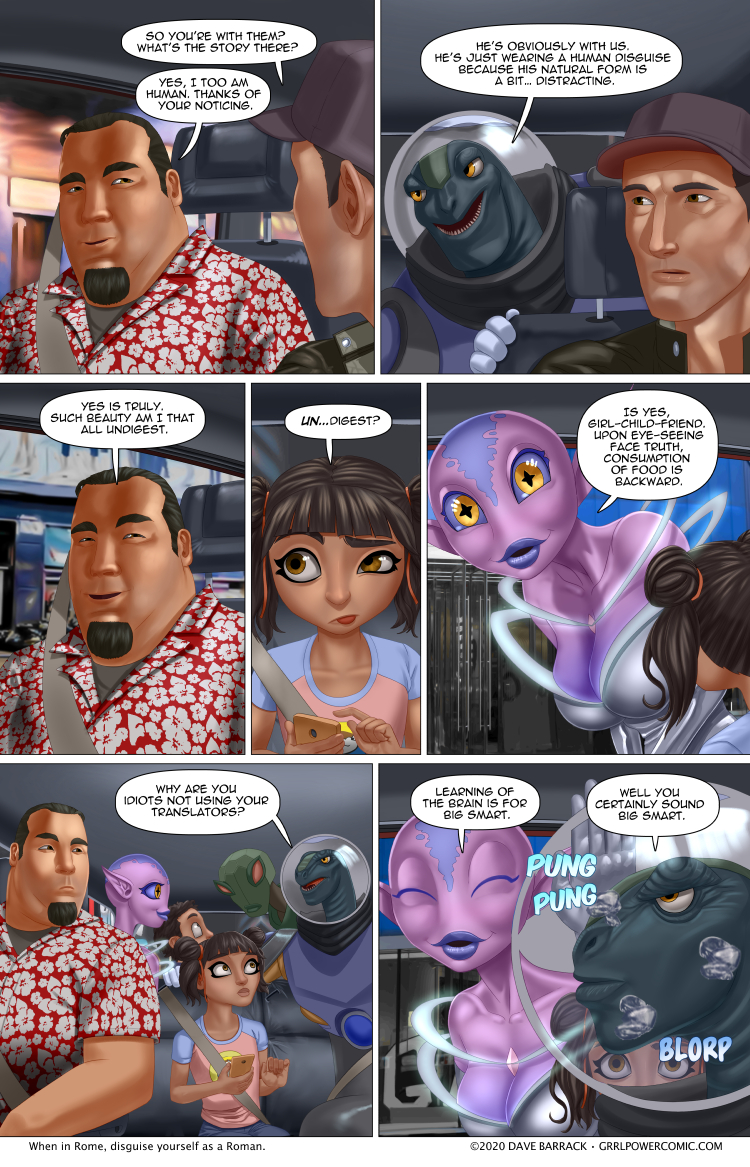Grrl Power #868 – Going native
I’m sure no one will be surprised to learn that this page contains a Patreon cameo. Robert Nava asked if he could appear an alien in a Robert Nava disguise, and I was like, that fits in rather nicely with a storyline I’m just about to start.
I do feel bad that some cameo request have been languishing in the void for a while, but I want to actually fit them into a storyline and not just have them walking by in the background. I guess “cameo” might be the wrong term actually. They’re more like supporting cast usually. Still, if you’re wondering where your cameo is, they’re in the queue. I may need to revisit the Twilight Council relatively soon, because there’s quite a few supernatural characters waiting in the wings.
Anyway. Universal Translators. I won’t go off on a huge tear about them*, as I’ve done so a few times in the past, but I do think that a society that had them would largely devolve into a bunch of monoglots. Why learn more than one language when only knowing one language would let you understand every other language? It’d be like everyone today and phone numbers. I can barely remember mine half the time, and if you put a gun to my head I couldn’t tell you my wife’s.
I actually think having universal translators would actually cause languages to converge in certain ways, because you’d want to properly translate certain concepts. The easiest fix for English would be to introduce more words for “love.” It’s a wildly overused word, because we have one single word to convey how you feel about a girlfriend, pet, parent, favorite food, brother, mentor, scent, sexual partner, etc, but clearly those are different emotions. Even having a word that means “like this more than anything else in this category” would help break up the love monopoly, but we don’t.
Western languages generally have plurals, Eastern languages by and large don’t. It’s one of those reasons why putting phrases through multiple languages in google translate always fucks stuff up, because information is lost. Language doesn’t have metadata. Universal translators might be able to introduce something like that, and reduce language from words to concepts and intent. Then putting new words in using the proper grammar would become a lot easier.
*I will.
Double res version will be posted over at Patreon. Feel free to contribute as much as you like!















The current and prior page may be a setup for Sydney’s trip to the Big Apple. The conflict to resolve will include a lost alien who can’t be understood by anyone. Sydney will find one of the floating symbols on her comm ball that she thought didn’t do anything will immediately let her converse with the alien (whose language consists entirely of swear words).
She doesn’t need a translator for that, swearing is her second language, or perhaps even first.
They’re close to the term ‘egestion’ which is just reverse ingestion.
It’s not reverse ingestion; it’s a nurturing response.
http://freefall.purrsia.com/ff100/fv00083.htm
Sam: Immigration insisted I don’t show my real face. Apparently my race triggers a nurturing response in humans. They would take one look at me and immediately begin to regurgitate their last meal for me.
*Reads author’s text
*gets idea for a phone that looks like you’re putting a gun to your head when answering it
*sells idea to Atlus for Persona 6
*Profit.
“The Simpsons” already did it, long time ago, except it was TV rather than a phone
saw it for an hair dryer in caddy shack II
As to “translating devices” and learning just one language…
There’s still going to be call for people to learn more languages… some languages won’t have a word for things.
“Let me get my Thor’s lightening fast think box (aka computer) up and running”.
This is especially true of words that have cultural or regional significance – cultures that don’t have contact with oceans don’t need a word for them.
Other languages may have the most evil of words…
… words that are their own antonym. Ie: fast. “To do something quickly.” “To remain still, ie ‘hold fast’”
Smart, alien-tech translators may handle them well, but anything we cobble today will have problems with them.
And quite simply…
… puns don’t come across in translation. The translation may be perfect, and at the same time fail to properly convey the subtext or other hidden elements that provide full meaning to the text.
Lastly, context…
Context can be of vital import. Absent alien-tech, I don’t think our translators will be getting this right for many decades.
Spoken: “Iku”
Translation: “Are you ready to head for lunch?”
Alternate translation: “I’m leaving for lunch.”
Alternate translation: “Go home. You haven no business being here.”
Alternate translation: “I’m outta here.”
Which meaning applies, depends on the context surrounding the statement. Was it spoken at home? In a business at midday? In a business after closing?
Language is complicated.
Puns are hard to translate, but sometimes you get lucky.
Example: in “in summer” from frozen Olaf sings “but put me in summer and I will be- a happy snowman” missing the word puddle. This song has a dutch version and on that part the translator basically directly translated it(by moving the pun to another part of the song).
Cleave means to split apart, or bring together.
These days — due to linguistic entropy — yes. But they were different: OE cleofan from Proto-Germanic *kleuban; and OE clifian from Proto-Germanic *klibajan. “The confusion was less in Old English when cleave (v.1) was a class 2 strong verb; but it has grown since cleave (v.1) weakened, which may be why both are largely superseded by stick (v.) and split (v.).”
Sam Starfall says his appearance causes a parental reaction in humans that they regurgitate food for him.
“Don’t let the chromatophores fool you. I exist in only three dimensions and I have a certificate saying so.”
-Sam Starfall
As a non-native speaker of english(and to a lesser extend two other languages) I agree with the statement made, but disagree with the example:
the term “love” cheats, while it’s hard to define, many languages have a comparable word.
The terms “like”, “merry”, “2 a.m”, and “purche” are for example more difficult to work with.
Like is just love with even more meanings and more context sensitiveness.
Merry has only in a few languages anything close to an equal and is also difficult define in other langues.
2 a.m is culture dependent(there’re cultures for who your on time on 2 a.m if you arrive at 4 a.m and cultures where you’re too late 2 a.m if you arrive on 2:15)
purche is easy to define, but has no synonym in the language where I came from.
Yes, “translation” is really a slippery thing to come to grips with. When I’m reading a Spanish newspaper, I usually have no trouble understanding what the text means and just cruise through it. But now and then I happen to think, “how would you say that in English?” and can only come up with an explanation, not a translation. And that’s only with Spanish, which has been in close contact with English for centuries.
Surprised Dave hasn’t done an “Invisible Idiot” joke yet: http://www.geoffreylandis.com/sight.htp
I’ll go one better… Google Translate Sings
I can tell you some amusing stories, Just from Japaneses coworkers that Americanisms Just dont translate, for example
Hungry enough to eat a horse.(we were in a food court, they looked around to see who actually sold horse meat…Ironicaly they decided it was Taco Bell.) or a House,
Bury the Hatchet,
Flaking out
Play it by ear
Restrooms, as in why do you have rooms to rest in I want to use the room with a toilet
Shit eating grin, self explanitory,
I cant put my finger on it,
and around here things like Ate it(Hate it)
Up my Alley
Fall. as in the season,
Hitting the Gas/lights/
People saying Period at the end of sentences.
Ballpark figure.
Referring to prices as Peanuts
Under the Weather
and Shoot the Breeze
Actualy I can go on for days but I need to post this now lol
Every nation has localisms that don’t always translate well into other languages, usually due to people taking the words literal
Saying ‘Period’ (or ‘Full stop’) at the end of sentences is intended to indicate the end of discussion (some people actually say ‘End of discussion’, or even both)
My maternal grandparents once hosted a Japanese exchange student. She had issues with colloquial expressions. When she was asked if she needed a few bucks to go shopping with she was just confused.
Sometimes translation is so hard you don’t even bother. The television series The Magic Roundabout was made using the visuals of the French stop-motion series Le Manège enchanté, but completely re-scripted, without any relation to the original at all. It was a big hit, with followers among adults as well as children.
https://en.wikipedia.org/wiki/The_Magic_Roundabout
“What’s Up, Tiger Lily?” was a Japanese spy flick that Woody Allen wrote and directed the English dubbing of. If I recall correctly, it revolved around an attempt to steal a top secret, highly addictive recipe for egg salad.
Why would they need translators? They’re already speaking better english than a lot of Americans.
I am not in happiness on your current sight of truth apparent sayings! Reverse with speed your talkings on words done before now!
I went to an ivy league school. I’m very highly educated. I know words, I have the best words. But there is no better word than stupid.
He is right for a change. There is no better word than stupid to describe the man.
Revealed: Trump’s professor thought he was his ‘dumbest student’ ever
Also his claim to have been “top of his class” at Wharton is an easily checked lie. The Wharton records for honors students in the year Trump graduated do not mention him at all.
Huh, that guys looks kinda familiar. Oh, a patreon cameo. Robert Nav… wait… HIGHTOWER!? Holy crud! If that’s my buddy hightower, then that’s one HECK of a coincidence!
Its this guy – https://www.facebook.com/robert.nava.940
“Learning of the brain is for big smart” might be my new favorite quote of this comic.
This whole gosh dang comic industry is in the pocket of Big Smart.
… yeah, it really would be nice to have a word that denotes the singular example out of a category which one most strongly prefers. I dare say that if it existed in English, it would be a strong contender for my new favorite word.
I would favorite a word like that.
I would “love” this :D
It would be best if such a word could be created.
Language can be fun and frustrating. Dialects are killer. Just try watch someone from New York try understand someone from South Carolina the first time they talk (that was the fun time). Similar thing occurred while I was in the navy. Had 2 communicators from the Philippines; turns out they were from different islands with different dialects (see above, with less funny results). Had to find some one else to man the phones.
Yeah, the Philippines are a fun example, my partner is from Cebu. Tagalog I can somewhat understand, but Bisayan, away from Cebu city I don’t follow at all even the islands can vary from the metro to the outlying villages. So glad we both speak English as our main language since she was taken to the USA as a child.
The best example of English language dialects is for ANYONE to try to understand a real Geordie, even most Brits struggle to follow them. If you hear a Geordie on a show and you understand more than one word in ten, it’s a fake.
Geordies cheat. They always slip in just enough Gaelic to disrupt your brain.
I roomed with a Geordie for a month in the UK, he’d been around just Americans for about a year and sounded like any other Englishman to me. I’d been there long enough to pick out most regional accents.
Then I met up with him back in the US a couple years later after he’d gone native again – the accent was so thick, he actually had to write it out a couple times.
Accents can be one way. I am a Virginia (USA) native, and have lived here the majority of my life, my time in college and the Army being exceptions. I spent a lot of summers in Montana as that was where my parents were born and my grandparents lived. I recall one Montanan saying that I had an East coast accent, while I never noticed any accent at all from Montanans. The only thing at all off in their speech, to me, was their use of some words in place of others. I was used to ‘soda’ and they all called it ‘pop.’ I used pancakes and they used hotcakes, etc.
I was once called in to translate a meeting between an American businessman who didn’t speak Spanish and a Venezuelan businessman who didn’t speak English. They had tried talking to each other in French, which they both spoke nearly fluently. Unfortunately the American spoke in Quebecois, and the Venezuelan spoke in Haitian Creole. Luckily my grandmother is from Belize, so I speak Latin American Spanish fluently.
I’ve found that English is particularly lacking in nuanced terms for emotions, even the words that we do have to describe distinctions between similar emotions are by and large treated as equivalents as opposed to having differences of degree. Like we have angry, mad, irate, annoyed, irked, etc. all meaning a negative emotional reaction to a stimulus that is qualitatively different from “sad” and, yes, there are in fact nuanced differences in their definitions, largely differences of scale or degree, but not entirely, but most people I’ve interacted with seem to treat them all as being identical, so when I say something annoys me people act like I’m grossly overreacting when in actuality I’m using annoy correctly in that it’s a really minor thing that I can live with but still want to complain about.
Really, the way kids are taught to use a thesaurus has lead to all kinds of loss of nuance, because people have the mistaken idea that words listed in a thesaurus are perfectly interchangeable in all ways, when more often than not, there are differences that affect how the respective words are supposed to be used, like facetious, ironic, sardonic, sarcastic, disingenuous can all refer to the same basic behavior, but there are in fact qualitative differences between the lot of them, and a couple of them also have more common definitions that decidedly don’t fall into this category.
Agreed. Thesauruses should be used to find alternate words that you already know the meaning of, not to substitute new words for old.
On Linkedin the other day, someone used the word “unravel” as a positive thing that would happen –
“Then you start and all your work and preparation begins to unravel itself…”
I think they meant either “unveil” or “unfurl”.
This is where English gets into the Dark Arts. From Etymology Online:
{1580s, “to untangle, disentangle, unwind” (originally with out), also “to entangle, become tangled or confused,” from Dutch ravelen “to tangle, fray,” rafelen “to unweave,” from rafel “frayed thread.” The seemingly contradictory senses of this word (ravel and unravel are both synonyms and antonyms) are reconciled by its roots in weaving and sewing: as threads become unwoven, they get tangled.}
And you thought Russian and Japanese were difficult.
Just one thing, ‘angry, mad, irate, annoyed, irked’ have nothing in common with ‘sad’, why anyone would get them confused is beyond me, not sure why you mentioned them both
That’s like mentioning ‘hot, dry, arid, etc.’ as being descriptive of the environment along with ‘damp’
Just makes no sense
It looks as though ‘sad’ was mentioned as an example of a different kind of negative emotional reaction. It’s another general term that covers a whole group of subtly different responses, but the differences between the ‘sad’ and ‘angry’ groups are far larger than the differences between individual states within each group. A bit like how biology has species, genus, family, etc.: ‘sad’ and ‘angry’ are geni within the family of ‘negative emotions, each containing several species of emotional states.
Pink Alien Girl seems fun.
Anyone notice that their positions in the car changed arround between the last few panels? Second last panel had disguised alien, little girl, fishbowl. Final panel had disguised swapped with pinkie.
Three rows of seats: Dave is in the passenger seat, daughter is in middle, Pinki is in the back because son (whose eyes will literally dry up and fall out like prunes if he doesn’t blink soon)
Actually, looking again, believe Pinki, daughter and Bub are all in the middle
Seems like three rows,
First row – two bucket seats for passenger (Rava) and driver (dad)
Second row – an entry space that Pinkie keeps leaning up into and two seats for daughter and Bubblehead
Third Row – Pinkie, son and Greenie.
In Panels 5 and 7, Pinkie is leaning forward from her seat into the entry space beside the daughter’s seat.
In Panel 6, Pinkie has leaned back a bit and turned farther, and either is looking at Bubblehead, or possibly watching Greenie as he shows the son something.
Look at all panels with daughter, her shoulders are below the level of seatback, now look at panel five again: you can see daughters’ shoulders and Pinki’s arm (and other things ;) ), why would Pinki lean that far forward from the back seat? She wouldn’t, makes more sense for her to be sitting against the door beside daughter
And it’s ‘Pinki’, so as not to be confused with Suzie’s reporter rival :P
I wonder if rather than translation into words if it would be more feasible to generate a short video clip of what was said. Obviously cgi instant silent films wouldn’t be “ideal” but probable easier to achieve than direct word to word translations. You’d also be communicating mostly one way unless you both had a similar set up.
Yeah some concepts don’t translate well into other languages ever, English especially is lacking the concepts to explain a lot of other languages well yet English itself is a thief as Nicoll summed up well.
“The problem with defending the purity of the English language is that English is about as pure as a cribhouse whore. We don’t just borrow words; on occasion, English has pursued other languages down alleyways to beat them unconscious and rifle their pockets for new vocabulary.” – James D. Nicoll
Blue / purple mark on pinkies head reminds me of the Minbari from Babylon 5
Ah, Delenn… Who knew a bald woman with a bone sticking out of her head could be so beautiful?
I think another ship landed in Australia to visit with the locals there.
https://news.yahoo.com/two-gold-nuggets-worth-350-213214687.html
So I notice that this timeline hasn’t entered social distancing yet, this is consistent with what we know.
I think the term is ‘comic time’. It’s always ‘now’.
However…2020 is non-canon, so masks and stuff aren’t shown.
Yes, they are still in 2010 (or 2011)
It’s not a ‘timeline‘ (implying parallel history), it’s a ‘time period‘ (meaning ‘specific point in time’)
There are lots of more precise words for the described situations than “love”. “Enjoyment”, “lust”, “attraction”, “care”, “distraction”, etc. The issue is not a lack of vocabulary in the language, but rather a lack of motivation in people to apply it. That’s not going away, no matter how good a translator is. Although, it would be interesting to imagine a ‘translator’ that interpreted your words not just into what you said, but what you meant, with perfect clarity. No more room for self-deception in a world where you can say “Brussels sprouts are my favorite vegetable” and have it come out as “I would rather eat 1000 Twinkies”.
Perhaps it is just me, but those appear to be bullets flattening when they hit the side of the reptile’s helmet. That might be why Maxima was summoned.
I doubt that “Pung Pung” and “Blorp” would be the sound effect for bullets flattening. Maybe the first, but not the second.
Bubbles
The “Pung Pung’ is Pinki patting his helmet (like people do to ‘slow’ people “There there, you will understand… eventually”), and the “Blorp” is him sighing in water (or maybe he farted from the stress of someone touching his helmet)
Pink Alien is cute AF
What are the sounds and visual effects in his helmet in the last panel?
probly tapping on a goldfish bowl but with the recorder in the water or that bubble sound you hear when your under water as well.
I’m betting they are that alien’s physiological markers for sarcasm.
There was a Far Side cartoon featuring an alien in a human disguise being confront by two punks and the disguised alien reply was “Yes..I..would..like..a..knuckle..sandwich..please!”
Words for love? Cherish is a word I use to describe all the feelings that I have hiding here inside. I associate with you. (See what I did there?) I ‘ship us.
Need more words? Add qualifiers and adverbs. A ‘mericun girly sits with a flower, plucking off petals, saying, “He loves me; he loves me not. He loves me; he loves me not.” A lil French girly says, “Je l’aime un peu, beaucoup, passionnément, à la folie, pas du tout”. Which means “he (or she) loves me a little, a lot, passionately, madly, not at all.”
I’m just imagining the people looking into these translators and finding all kinds of different English words that map onto “kill” – we have different words for “murder” and “execution” and “extermination” and “culling” and just on and on and on. Murder for different reasons, murder with different weapons, wartime vs. criminal vs. judicial killing, and so on. We don’t need ten different adjectives. We have a handy word or expression for each combination.
And then they look around and find German. And Chinese. And Japanese. And they all have their own distinct vocabularies making fine gradations across the entire spectrum of killing. At some point, they have to put the device down and consider whether they really want to come here.
Given the general behavior of all the aliens we’ve seen so far is much the same as humans… chances are they have just as many words for killing as we do. Cause they are likely to be just as self-deceptive about it.
And that’s before you get into the fictional extensions of the field. For example, the degree and methods of political intrigue in the Dune universe are illustrated far more by the variety of language available than by on-page events – even going as fine as differentiating ‘poison in the food’ chaumas versus ‘poison in the drink’ chaumurky> (and probably other variants for poison in the air, or on a touched surface, or injected, or…).
People criticize the English for not having enough words for varying degrees of ‘love’, do you really need a thousand different words for ‘snow’? :thinking:
That is a myth!
Given I’m not Inuit, no.
For the same reason English don’t, regarding ‘love’: if more clarificationing is needed, then they will give it
Just like how, with the thousand different meanings for snow, they had to learn each and every one of those individual different meanings, rather than just one word, and a dozen quantifiers that can be used more than once
Maybe some aliens would rather keep thier language and culture a secret from other races as much as possible.
In… cluding the ones they are going tourist with to a backwards sub-FTL planet? A planet with homicidal genocidal xenophobic arseholes who managed to destroy a Fel ship and troops with their bare hands in just a few minutes?
Here’s something that always bothered me, why do universal translators never translate names? Name’s when not made up out of whole cloth have meanings attached to them after all.
Probably for the same reason that your brain does not translate many names into their actual meanings. When was the last time you met someone named Joe Smith (just an example) and thought to yourself “Hey, that guy should be built a lot better since he spends his days swinging a heavy hammer against metal?”
Intent.
If Alien translator devices work….honestly I could stop that there without any high sci-fi tech explinations for how;
then by some (insert complex psionic or whatever) means they should denote the intent of the speaker in regards to proper nouns to not literally translate them.
-helps if the speaker like some languages…use names *especially first names* that aren’t even from their own language or are just combinations of sounds that sound nice and made up a meaning later; this seems more common in English speaking countries I feel.
It’s probably just me, but the one I will call Bubblehead looks like a cross-breed of a Gorn (STOS) and
Buzz Lightyear. Am I right? … No? Okay, I’ll get my coat.
“Love” is a word that ties back to that same thing, though, right? Loving any person just means you know how to trust them and to you they are like family, in that their flaws are something you either can overlook or in that their flaws could even be endearing, at times. So extrapolating, loving a smell means that it is pleasant and as family to you, however you’d like to interpret that.
Also, we do have a word for “I like this in this category more than all others in this category.” The word is ‘favorite.’
“devolve into a bunch of monoglots”
Would that we could. Why is that “devolving”?
Depends how capable your single language is of conveying all the information necessary, in a concise and unambiguous manner. While preferably also having enough room for creative ambiguity to satisfy artistic purposes. Not impossible, but a tricky proposition – and a harder one to get it widely accepted.
Wow Althaars people are in the Grrl Power universe